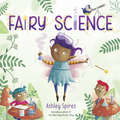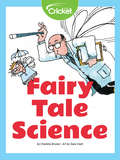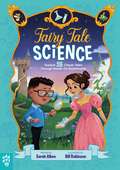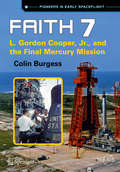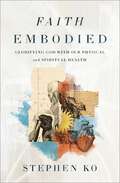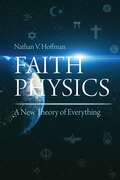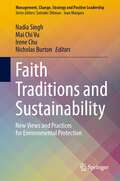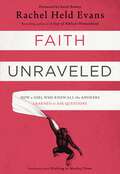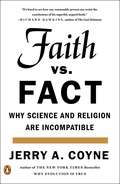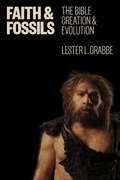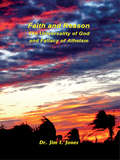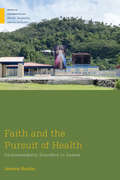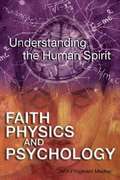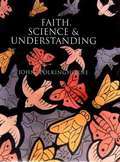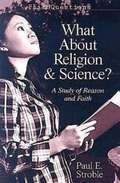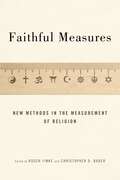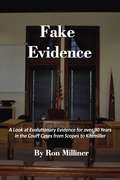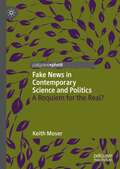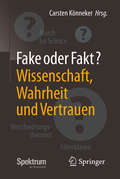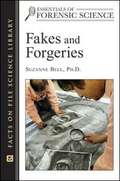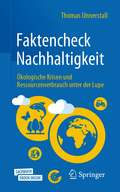- Table View
- List View
Fairy Science (Fairy Science)
by Ashley SpiresAn enchanting STEM-and-fairy-filled picture book from the award-winning author-illustrator of The Most Magnificent Thing!All the fairies in Pixieville believe in magic--except Esther. She believes in science.When a forest tree stops growing, all the fairies are stumped--including Esther. But not for long! Esther knows that science can get to the root of the problem--and its solution! Whether you believe in fairy magic or the power of science, you will be charmed by Esther, the budding fairy scientist.
Fairy Science (Fairy Science)
by Ashley SpiresThe award-winning author of The Most Magnificent Thing introduces the value of science and inquiry to young readers with humor and heart. For fans of Ada Twist, Scientist and Hidden Figures.Esther the fairy doesn't believe in magic. But fairies are all about magic, despite Esther's best efforts to reveal the science of their world. No matter how she and her bird, Albert, explain that rainbows are refracted light rather than a path to gold, or that mist is water evaporating rather than an evil omen, or the importance of the scientific method, her fairymates would rather just do magic. So when the other fairies' solution to helping a dying tree is to do a mystical moonlight dance, Esther decides to take it upon herself to resuscitate the tree . . . with the scientific method, some hypothesizing, a few experiments and the heady conclusion that trees need sunlight to live! But while Esther manages to save the tree, she can't quite change the minds of her misguided fairymates . . . or can she?Fairy Science, the first in a hilarious new picture book series, introduces a charming, determined heroine as she learns about the world and celebrates the joys of curiosity and exploring science.
Fairy Tale Science
by Charlene BrussoIs magic real? Fairy tales are stories that teach us moral issues, often with the use of magic. But what would happen to those stories if they were set in the real world? See how science and technology can create the "magic" you see in your favorite fairy tales.
Fairy Tale Science
by Sarah AlbeeExplore the laws of physics, principles of chemistry, and wonders of biology in this collection of classic stories with a hands-on STEM twist.From Snow White to Chicken Little to Ali Baba and the Forty Thieves—read each story like a scientist!• Determine if a glass slipper can withstand an evening of ballroom dancing.• Explore the buoyancy of a magical frog.• Test the power of blowing air on a house.And so much more!Find out what happens actually ever after!"A lively and captivating book." - Kirkus
Faith 7
by Colin BurgessThis book celebrates the final spaceflight in the Mercury series, flown by NASA astronaut Gordon Cooper, who led an adventurous life in the cockpit of airplanes and spacecraft alike, and on his Mercury mission he became the last American ever to rocket into space alone. He flew in the Mercury and Gemini programs and served as head of flight crew operations in both the Apollo and Skylab programs. Based on extensive research and first-person interviews, this is a complete history of the Faith 7 flight and its astronaut. Cooper later gained notoriety following the release of the movie, The Right Stuff, in which he was depicted by Dennis Quaid, but Burgess discovers there was even more drama to his story. It completes the "Pioneers in Early Spaceflight" subseries in fitting fashion.
Faith Embodied: Glorifying God with Our Physical and Spiritual Health
by Stephen KoScientist, physician, and pastor Stephen Ko explains how to live and worship incarnationally and glorify God with our bodies.Many of us don't see much connection between spiritual and physical health. We say grace before digging into greasy, fatty meals we know are bad for us. We read Scripture on our phones before switching to social media feeds that hijack the neural circuitry in our brains. Or we take our physical health too seriously, distancing ourselves from the sick and the needy whom Jesus embraced.On his journey from pediatrician to public health officer for the CDC to senior pastor of the largest New York Chinese Alliance Church, Stephen Ko has seen that these divisions between physical and spiritual health are artificial. In Faith Embodied, he reminds us that our "bodies are temples of the Holy Spirit" (1 Corinthians 6:19). Christ incarnate is deity in flesh, and His spirit is incarnate in us. Living and worshiping incarnationally is consciously embracing what the Creator has designed in His image, from the finest, microscopic details to vital organs within our body, enabling the Holy Spirit to work in us.Faith Embodied will teach you to:Understand subconscious ways that thwart the design of the Creator.Embrace choices that invite incarnational health, living, and worship.Experience God in every aspect of your life, from flesh and bone to heart and soul.View the five senses (sight, smell, hearing, touch, taste) in a different lightReflect the image of God in the way you breathe, move, create, love, and rest.Weaving together insights from faith, science, and medicine, Ko reveals the marvelous ways in which our physical and spiritual health can prepare us to become instruments of God's healing in the world.A companion streaming video study is also available.
Faith Physics: A New Theory of Everything
by Nathan V HoffmanFaith Physics is a new Theory of Everything (ToE) combining ancient spiritual wisdom and modern quantum physics findings to deliver a belief system that is both intellectually sound and spiritually satisfying. It maintains an ineffable Supreme Con
Faith Traditions and Sustainability: New Views and Practices for Environmental Protection (Management, Change, Strategy and Positive Leadership)
by Nicholas Burton Mai Chi Vu Nadia Singh Irene ChuMajor religious traditions have begun to reflect on sustainability concerns in their theology and practice. Little research, however, has explored the implications of this development for organizational behavior as well as secular thinkers and practitioners of sustainable development. This book elucidates the varied ways in which faith traditions provide new forms of coping mechanisms to deal with environmental challenges confronting humanity through an integrative review and critical analysis of recent research. Bringing together a compendium of religious and faith traditions, rooted in both Eastern and Western approaches, the work provides a new perspective and presents alternative paradigms to deal with the contemporary ecological crises. The UN Interfaith Statement on Climate Change (2021) highlights the importance of faith traditions to foster “shared moral responsibility for the environment” and set an example for the “life-style of billions of people and political leaders around the world to act more boldly in protecting people and planet.” This interdisciplinary work examines the interaction between management/organizational settings and spirituality focusing on a range of contexts and spiritual traditions including Buddhism, Sikhism, Christianity, Confucianism, mindfulness practices and indigenous spiritual traditions. Featuring theoretical papers and case studies from different contexts and geographical regions, this book provides researchers, faculty, students, and practitioners with a broad overview of the field from a research perspective, while keeping an eye on building a bridge between scholarship and practice.
Faith Unraveled: How a Girl Who Knew All the Answers Learned to Ask Questions
by Rachel Held EvansHow an evolving spiritual journey leads to an unshakeable faith Eighty years after the Scopes Monkey Trial made a spectacle of Christian fundamentalism and brought national attention to her hometown, Rachel Held Evans faced a trial of her own when she began to have doubts about her faith. In Faith Unraveled, Rachel recounts growing up in a culture obsessed with apologetics, struggling as her own faith unraveled one unexpected question at a time. In order for her faith to survive, Rachel realizes, it must adapt to change and evolve. Using as an illustration her own spiritual journey from certainty to doubt to faith, Evans challenges you to disentangle your faith from false fundamentals and to trust in a God who is big enough to handle your tough questions. In a changing cultural environment where new ideas seem to threaten the safety and security of the faith, Faith Unraveled is a fearlessly honest story of survival.
Faith Versus Fact
by Jerry A. CoyneThe New York Times bestselling author explains why any attempt to make religion compatible with science is doomed to fail In his provocative new book, evolutionary biologist Jerry A. Coyne lays out in clear, dispassionate detail why the toolkit of science, based on reason and empirical study, is reliable, while that of religion--including faith, dogma, and revelation--leads to incorrect, untestable, or conflicting conclusions. Coyne is responding to a national climate in which over half of Americans don't believe in evolution (and congressmen deny global warming), and warns that religious prejudices and strictures in politics, education, medicine, and social policy are on the rise. Extending the bestselling works of Richard Dawkins, Daniel Dennett, and Christopher Hitchens, he demolishes the claims of religion to provide verifiable "truth" by subjecting those claims to the same tests we use to establish truth in science. Coyne irrefutably demonstrates the grave harm--to individuals and to our planet--in mistaking faith for fact in making the most important decisions about the world we live in.
Faith Versus Fact: Why Science and Religion Are Incompatible
by Jerry A. CoyneThe New York Times bestselling author explains why any attempt to make religion compatible with science is doomed to fail In his provocative new book, evolutionary biologist Jerry A. Coyne lays out in clear, dispassionate detail why the toolkit of science, based on reason and empirical study, is reliable, while that of religion--including faith, dogma, and revelation--leads to incorrect, untestable, or conflicting conclusions. Coyne is responding to a national climate in which over half of Americans don't believe in evolution (and congressmen deny global warming), and warns that religious prejudices and strictures in politics, education, medicine, and social policy are on the rise. Extending the bestselling works of Richard Dawkins, Daniel Dennett, and Christopher Hitchens, he demolishes the claims of religion to provide verifiable "truth" by subjecting those claims to the same tests we use to establish truth in science. Coyne irrefutably demonstrates the grave harm--to individuals and to our planet--in mistaking faith for fact in making the most important decisions about the world we live in.
Faith and Fossils: The Bible, Creation, and Evolution
by Lester L. GrabbeMany books have been written on the Bible and evolution by scientists, but this volume is written by a biblical specialist. In Faith and Fossils Lester Grabbe, a prominent Hebrew Bible scholar, examines the Bible in its ancient context and explores its meaning in light of emerging scientific evidence. Both the Bible and the fossil record raise significant questions about what it means to be human, and Grabbe expertly draws on both sources to grapple with who we are and where we came from. Written in uncomplicated language and featuring eleven spectacular color plates, Grabbe&’s Faith and Fossilscreatively shows how science and faith intersect in questions about human origins.
Faith and Fossils: The Bible, Creation, and Evolution
by Lester L. GrabbeMany books have been written on the Bible and evolution by scientists, but this volume is written by a biblical specialist. In Faith and Fossils Lester Grabbe, a prominent Hebrew Bible scholar, examines the Bible in its ancient context and explores its meaning in light of emerging scientific evidence. Both the Bible and the fossil record raise significant questions about what it means to be human, and Grabbe expertly draws on both sources to grapple with who we are and where we came from. Written in uncomplicated language and featuring eleven spectacular color plates, Grabbe’s Faith and Fossilscreatively shows how science and faith intersect in questions about human origins.
Faith and Reason: The Universality Of God And Fallacy Of Atheism
by Jim I. JonesFaith and Reason may be of interest to people who wish to see a path to God based on reason. A concept of God is foundational for the sciences, philosophy, anthropology, psychology, and sociology as well as theology and major religions. The concept of no god and atheism is fallacious; it is nonsense to deny the universality of God, which plays a significant role in the lives of more than three-quarters of the world’s people. The book includes ideas from distinguished theologians, philosophers and scientists. The need for consideration of a theological framework for religion is presented. Its purpose is twofold. First, it acts as a roadmap for understanding societal and personal improvement and advancement initiatives that use a holistic view of the history of relevant philosophical perspectives to present how belief and commitment to community can guide improving the human condition. Second, it presents detailed modeling constructs, and references to specific thinkers and philosophers to demonstrate the need for a spiritual relationship with God and each other.
Faith and the Pursuit of Health: Cardiometabolic Disorders in Samoa (Medical Anthropology)
by Jessica HardinFaith and the Pursuit of Health explores how Pentecostal Christians manage chronic illness in ways that sheds light on health disparities and social suffering in Samoa, a place where rates of obesity and related cardiometabolic disorders have reached population-wide levels. Pentecostals grapple with how to maintain the health of their congregants in an environment that fosters cardiometabolic disorders. They find ways to manage these forms of sickness and inequality through their churches and the friendships developed within these institutions. Examining how Pentecostal Christianity provides many Samoans with tools to manage day-to-day issues around health and sickness, Jessica Hardin argues for understanding the synergies between how Christianity and biomedicine practice chronicity.
Faith, Physics and Psychology: Rethinking Society and the Human Spirit
by John Fitzgerald MedinaOn religion, spirituality, and new society. Despite the progress of Western Civilization in economic, scientific, and other areas, a lack of corresponding progress with respect to spiritual life has left much of society feeling disoriented and unbalanced. Medina's insight sheds light on ways to address this imbalance. The ultimate goal of this examination is to present a path toward a prosperous global civilization that fulfills humanity's physical, psychological, and spiritual needs.
Faith, Science and Understanding
by John C. PolkinghorneOne of the most highly regarded scientist-theologians of our time explores aspects of the interaction between science and theology, focusing in particular on reconciling the scientific and religious theories about creation of the universe. Three centuries of debate are examined, including the works of important contemporary contributors.
Faith, Science and Understanding
by John PolkinghorneIn this captivating book, one of the most highly regarded scientist-theologians of our time offers a thought-provoking exploration of the interaction between science and theology. John Polkinghorne defends the place of theology in the university, discusses the role of revelation in religion, and focuses closely on reconciling what science can say about the processes of the universe with theology's belief in a God active within creation.
FaithQuestions - What About Religion and Science?: A Study of Reason and Faith (FaithQuestions)
by Paul E. StrobleThis book invites us to consider ways to remain confident in our faith as we understand and appreciate the discoveries and advances of science. How can Christians integrate, believe, or accept all the teachings of science, the Bible, and Christian tradition? How can we believe in both the discoveries of science and the Bible? Are science and religion compatible or incompatible? Does the Christian understanding that God created the universe exclude the findings and discoveries of science? What is the role of faith in the world of education? What can we believe about intelligent design? If we believe in evolution, can we believe in God? Does the Big Bang theory exclude God? If we are Christians, can we support stem-cell research and cloning? Can science help us understand the afterlife? Does science negate or support prayer? What is the difference between faith and reason? Do they exclude or complement one another? As Paul Stroble addresses these questions and others, he helps us examine different possible ways that religion and science relate to each other and ways that science and religion provide meaning and value in our lives. PAUL STROBLE is an elder of the Illinois Great Rivers Conference of The United Methodist Church. He has served both as parish pastor and college instructor and currently teaches at the University of Akron, where he earned an Excellence in Teaching award. He is a long-time writer-researcher for the United Methodist curriculum FaithLink and author of numerous articles and curricular materials. Among his eleven books are Paul and the Galatians and What Do Other Faiths Believe? He is married to Dr. Beth Stroble, and they have a daughter, Emily. The FaithQuestions study series is designed to meet the needs of people who have questions about the Christian faith and who desire a deeper engagement with scripture and with discipleship as they explore studies of issues in theology, ethics, missions, Bible interpretation, and church history. It seeks to equip a new generation of church leaders to appreciate the eternal message of the gospel and to develop the skills to articulate its relevance in our contemporary context. The series would be a good choice for users who have completed Disciple. this will be the ninth study in the series, following What About the Rapture -What Do Other Faiths Believe - What Happens When We Die -What About Divine Healing - What About the Trinity - What About Forgiveness- What About the Devil - What About Reading the Bible
Faithful Measures: New Methods in the Measurement of Religion
by Edited by Roger Finke and Christopher D. BaderA venture into the art and science of measuring religion in everyday life In an era of rapid technological advances, the measures and methods used to generate data about religion have undergone remarkably little change. Faithful Measures pushes the study of religion into the 21st century by evaluating new and existing measures of religion and introducing new methods for tapping into religious behaviors and beliefs. This book offers a global and innovative approach, with chapters on the intersection of religion and new technology, such as smart phone apps, Google Ngrams, crowdsourcing data, and Amazon buying networks. It also shows how old methods can be improved by using new technology to create online surveys with experimental designs and by developing new ways of mining data from existing information. Chapter contributors thoroughly explain how to employ these new techniques, and offer fresh insights into understanding the complex topic of religion in modern life. Beyond its quantitative contributions, Faithful Measures will be an invaluable resource for inspiring a new wave of creativity and exploration in our connected world.
Fake Evidence: A Look at Evolutionary Evidence for over 90 Years in the Court Cases from Scopes to Kitzmiller
by Ron MillinerFake Evidence examines the scientific evidence offered in evolution-creation court cases from the State of Tennessee v. John Thomas Scopes in 1925 to Kitzmiller v. Dover Area School District in 2005. The validity of the different types of evidence is tested against the current ideas in the scientific literature. Much of the evidence offered in the past would not be offered in such a case if held today.The first chapter of the book looks at court evidence in light of the nature of science. Court cases have been decided based on fingerprints, handwriting samples, DNA, etc. only to be overturned later. Why are evolution cases allowed to stand when the evidence used in the trial is no longer valid?The State of Tennessee v. John Thomas Scopes is the first evolution-creation case. It is discussed in chapter two. Because of its well-known attorneys, Clarence Darrow and William Jennings Bryan, it attracted national attention. In this trial, a hoax like the Piltdown Man was offered as evidence for the proof of evolution.Chapter three moves ahead to the 1960s and considers Epperson v. Arkansas that declared laws forbidding the teaching of evolution as unconstitutional. This case is also considered in light of two other court cases decided that decade--Engel v. Vitale that removed state-initiated prayers in the classroom and Abington School District v. Schempp that ruled against a daily Bible reading in school. How were these cases similar?Since evolution had to be taught, efforts were made to have evolution and creation taught side by side. These efforts brought about two court cases--McLean v. Arkansas Board of Education and Edwards v. Aguillard. McLean v. Arkansas Board of Education dealt with an Arkansas law and was decided in the United States District Court for the Eastern District of Arkansas and was limited to that region. Edwards v. Aquillard was a similar law passed in Louisiana which was appealed all the way to the United States Supreme Court. The justices declared the teaching of scientific creationism was religious teaching and thus unconstitutional.The final case that is examined in this work is Kitzmiller v. Dover Area School District. The school board in Dover, Pennsylvania wanted to see its students become aware of intelligent design. A good deal of this case centered on showing that intelligent design is religious teaching so that the judge could rule against it based on the earlier court cases against a religious view being taught in public schools.Fake Evidence closes with a look at some of the view expressed against religion in Kitzmiller v. Dover Area School District and the dangers found in those views. The book also contains several appendices, including one on &“The Fruits of Evolution.&”
Fake News in Contemporary Science and Politics: A Requiem for the Real?
by Keith MoserThis transdisciplinary book investigates the profound repercussions of living in a post-truth world in which 'alternative facts' and post-truth knowledge claims, often bordering on the absurd, have replaced the real in the collective imagination of millions of people around the planet. Through discussions on climate change denial, the anti-vaccination movement, the January 6th Insurrection and the Russia-Ukraine War, this study explores the gravity of the current 'infodemic,' or the increasing inability of a large segment of the population to distinguish between reality and misrepresentation, and the destabilizing impact this infodemic has on democratic models of governance around the globe, coinciding with the rise of autocratic forms of populism.
Fake oder Fakt?
by Carsten KönnekerGibt es Alternativen zu Fakten?Dieses Buch greift die wichtigen Fragen auf, die seit dem „March for Science“ im Frühjahr 2017 auf der öffentlichen Agenda stehen: Untergraben „gefühlte Wahrheiten“ und „alternative Fakten“ zunehmend unsere gesellschaftlichen Debatten? Was kann überhaupt als gesichertes Wissen gelten - und wie gelangen Forscherinnen und Forscher an Evidenz? Ist wissenschaftsskeptisches oder gar -feindliches Denken auf dem Vormarsch? Und was macht Menschen anfällig für Fake News und Verschwörungstheorien?Die hier versammelten Beiträge aus Spektrum der Wissenschaft, Gehirn&Geist sowie spektrum.de liefern vielfältige Anregungen, neu über Wahrheit, Unwahrheit, Glaubwürdigkeit und Vertrauen in die Wissenschaft nachzudenken. Der erste Teil des Buches behandelt die Frage, was Fakten ausmacht und wie Wissenschaftler sie gewinnen. Hier wird unter anderem deutlich, dass Forschung keine ewigen Gewissheiten produziert, sondern dass Interpretation, Vorläufigkeit und Revision sie im Gegenteil geradezu kennzeichnen. Der zweite Teil stellt Fake News und Verschwörungstheorien in den Mittelpunkt und erläutert, was Menschen dazu bringt, selbst die krudesten Behauptungen für bare Münze zu nehmen - und wie sich Lügen medial verbreiten. Der abschließende Teil widmet sich der Frage, wie Vertrauen in Wissenschaft entsteht und welche systemischen Schwachstellen des Wissenschaftsbetriebs dieses unterminieren können.
Fakes and Forgeries (Essentials of Forensic Science)
by Suzanne BellEssentials of Forensic Science is a seven-volume set that explores a number of significant aspects of the field, from its inception to its application in the modern laboratory and courtroom. From its roots in the Middle Ages and farther back to ancient Greece, forensic science, past, present, and future, is provided an intriguing overview in this informative set.
Faktencheck Nachhaltigkeit: Ökologische Krisen und Ressourcenverbrauch unter der Lupe
by Thomas UnnerstallDer Mensch treibt Raubbau an der Natur, er verbraucht zu viel Energie, zu viele Rohstoffe, zu viel Land. Kurzum: Die jetzigen Wirtschafts- und Lebensweisen der Menschheit, zumal bei uns im Westen, sind nicht nachhaltig.Wer würde diesem Urteil widersprechen? Die Indizien scheinen doch erdrückend: Artensterben, Regenwaldabholzung, Rohstoffknappheit, Bodenerosion, Plastikmüll, ökologischer Fußabdruck und natürlich der Klimawandel. Aber – wie belastbar sind diese Indikatoren eigentlich? Gibt es vielleicht auch anderslautende Indizien, positive Entwicklungen? Und sind all‘ diese Probleme von gleicher Dringlichkeit?Dieses Buch gibt Ihnen Antworten: fundiert, nachvollziehbar, auf den Punkt gebracht. Es weist nach, dass die Berichte und Schlagzeilen zu ökologischen Themen in den gängigen Medien oft einseitig, überspitzt und damit irreführend sind. Das Buch verharmlost nicht, aber es differenziert. Anhand der einschlägigen internationalen Berichte und Datenbanken stellt es Gesamtzusammenhänge dar, wo sonst meist nur einzelne, plakative Zahlen herausgegriffen werden.Mit über 70 grafischen Darstellungen zeichnet das Buch so ein neues Bild vom Zustand des Planeten und von den Auswirkungen menschlichen Wirtschaftens und Konsumierens. Am Ende steht eine klare Prioritätenliste für die tatsächlichen Herausforderungen in Sachen Nachhaltigkeit – für die Menschheit insgesamt, und auch für den Westen.
